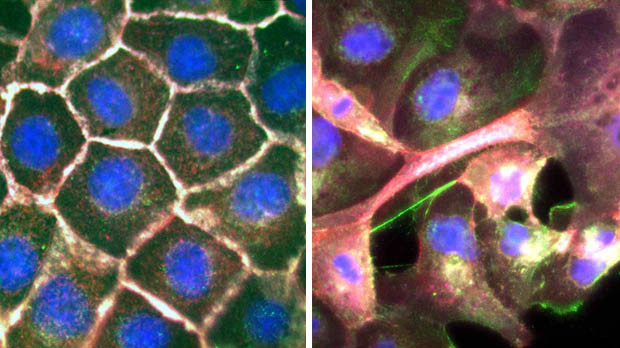Lung cancer spread can be controlled by keeping cells bound together, says study

Targeting a cell recycling process could stop lung cancer from spreading by keeping the cells together.
A study has found that when the protein links that bind the lung cancer cells are broken, the cells spread into the body.
Researchers at the Cancer Research UK Manchester Institute discovered that the ties linking protein TIAM1 to the cells are snapped when cell maintenance work goes wrong.
In a recycling process healthy cells scrap old cell parts, break them down and use them. In lung cancer cells, however, the recycling is unchecked and scraps too many TIAM1 ties.
Lead researcher, Dr Angeliki Malliri, at the Cancer Research UK Manchester Institute at the University of Manchester, said: "This important research shows for the first time how lung cancer cells sever ties with their neighbours and start to spread around the body, by hijacking the cells' recycling process and sending it into overdrive. Targeting this flaw could help stop lung cancer from spreading."
There are almost 43,500 new cases of lung cancer in the UK each year. It is the most common cause of cancer deaths and kills more than 35,000 people in the UK each year.
Nell Barrie, Cancer Research UK's senior science information manager, said: "Lung cancer causes more than one in five of all cancer deaths in the UK and it's vital that we find effective new treatments to fight the disease and save more lives.
A new drug from Astra Zeneca recently claimed to successfully shrink lung tumours by over 50%.
But most treatments target only the genetic fault identified by the biopsy allowing other regions of the tumour to progress. By detecting the cancer at an early stage and following one genetic track would make treatment more effective.
Smoking triggers most of the early genetic faults leading to lung cancer.
Tobacco use is the most important risk factor for cancer causing over 20% of global cancer deaths and about 70% of global lung cancer deaths, says the World Health Organization. Approximately 1.59 million deaths were reported globally from lung cancer.
Lung cancers are particularly hard to treat as they can lie dormant for almost 20 years before turning aggressive and difficult to treat.
© Copyright IBTimes 2025. All rights reserved.





















